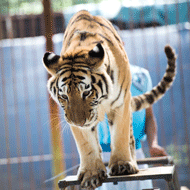Italy confirms ban on animal performances in zoos

Born Free has been investigating zoos in Italy since 2010 owing to concerns raised by British tourists. (Stock photo).
The Italian government has confirmed that animal performances in zoos are prohibited under national law, and zoos that do not meet the basic requirements will have their licences withdrawn.
Global wildlife charity the Born Free Foundation, and Italian animal protection NGO, LAV, welcomed the news. The organisations say they have sent five reports to the Italian government in the past two years, documenting inadequate law enforcement and substandard conditions in zoos and aquaria. But until recently, no response had been received.
In a letter to the two organisations, the Italian Ministry of Environment wrote: 'The use of animals in shows, is prohibited under national law.' The letter also stated that: 'Any zoo which does not meet the compulsory basic requirements [of the law] will have their [zoo] licence withdrawn.'
Daniel Turner, who was project manager of Born Free's EU Zoo Inquiry 2011, said the statement is "certainly encouraging". However, with large numbers of Italian zoos featuring animal performances, he is concerned that change will be "slow and ineffective."
Born Free has been investigating zoos in Italy since 2010 owing to concerns raised by British tourists. Some of the animal performances observed include parrots riding bicycles, dolphins jumping through hoops and a chimpanzee dressed in clothes.
The charity's EU Zoo Inquiry documented large numbers of wild animals being used in performances with a focus on entertainment, showing unnatural behaviours - often to music. The inadequate conditions for animals were found to be largely due to poor implementation and enforcement of the law.
Born Free and LAV say they will ensure the Italian ministry follows up their statement with action. A further report evaluating the effectiveness of the Italian zoo law is expected next year.
Members of the public can share their views and experiences about zoos in their country by completing the following questionnaire: https://ec.europa.eu/eusurvey/runner/ZoosREFITpublic



 The Veterinary Medicines Directorate (VMD) is inviting applications from veterinary students to attend a one-week extramural studies (EMS) placement in July 2026.
The Veterinary Medicines Directorate (VMD) is inviting applications from veterinary students to attend a one-week extramural studies (EMS) placement in July 2026.